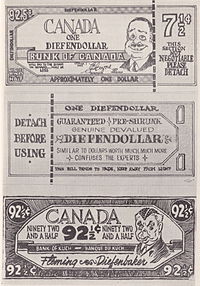Portal:Conservatism
| Main page | Showcase | Project |
Introduction
Conservatism is a cultural, social, and political philosophy and ideology, which seeks to promote and preserve traditional institutions, customs, and values. The central tenets of conservatism may vary in relation to the culture and civilization in which it appears. In Western culture, depending on the particular nation, conservatives seek to promote a range of institutions, such as the nuclear family, organized religion, the military, the nation-state, property rights, rule of law, aristocracy, and monarchy. Conservatives tend to favour institutions and practices that enhance social order and historical continuity.
Edmund Burke, an 18th-century Anglo-Irish statesman who opposed the French Revolution but supported the American Revolution, is credited as one of the forefathers of conservative thought in the 1790s along with Savoyard statesman Joseph de Maistre. The first established use of the term in a political context originated in 1818 with François-René de Chateaubriand during the period of Bourbon Restoration that sought to roll back the policies of the French Revolution and establish social order.
Conservatism has varied considerably as it has adapted itself to existing traditions and national cultures. Thus, conservatives from different parts of the world, each upholding their respective traditions, may disagree on a wide range of issues. Historically associated with right-wing politics, the term has been used to describe a multiple variety of views . Conservatism may be either libertarian or authoritarian, populist or elitist, progressive or reactionary, moderate or extreme. (Full article...)
Selected article
In a close and controversial election, Bush was elected President in 2000 as the Republican candidate, defeating Vice President Al Gore in the Electoral College.
A series of terrorist attacks occurred eight months into Bush's first term as president on September 11, 2001. In response, Bush announced a global War on Terror, ordered an invasion of Afghanistan that same year and an invasion of Iraq in 2003. In addition to national security issues, Bush promoted policies on the economy, health care, education, and social security reform. Bush successfully ran for re-election against Democratic Senator John Kerry in 2004, in another relatively close election. He was a highly controversial figure internationally, with public protests occurring even during visits to close allies, such as the United Kingdom.
Selected quote
The real division is not between conservatives and revolutionaries but between authoritarians and libertarians.
— George Orwell, in a letter to Malcolm Muggeridge (4 December 1948)
Selected image
An economic downturn was beginning in Canada by 1958. By mid-1961, differences in monetary policy led to open conflict with Bank of Canada Governor Coyne, who adhered to a tight money policy. Negotiations between Minister of Finance Fleming and Coyne for the latter's resignation broke down, with the governor making the dispute public, and John Diefenbaker sought to dismiss Coyne by legislation. Once he had the opportunity to testify (denied him in the Commons), Coyne resigned, keeping his increased pension, and the government was extensively criticised in the press. By the time Diefenbaker called an election for June 18, 1962, the party had been damaged by loss of support in Quebec and in urban areas as voters grew disillusioned with Diefenbaker and the Tories. The PC campaign was hurt when the Bank of Canada was forced to devalue the Canadian dollar to 92½ US cents; it had previously hovered in the range from 95 cents to par with the United States dollar. Privately printed satirical "Diefenbucks" (pictured) swept the country.
Credit: Wehwalt
Did you know...
- ...that Ronald Reagan's autobiography, An American Life, reached number eight on The New York Times' bestsellers list?
- ...that Geoffrey Wheatcroft, the author of The Strange Death of Tory England, advises British conservatives to learn from the conservatism of the socialist George Orwell?
- ... that Canadian Conservative Party candidate Bernard Trottier won a seat in the 41st Canadian Parliament by defeating the incumbent Michael Ignatieff, the leader of the Liberal Party and leader of the Official Opposition, in the 2011 federal election?
Selected anniversaries in May
- 1979 – Margaret Thatcher becomes the first female Prime Minister of the United Kingdom.
- 1940 – the Norway Debate in the British House of Commons begins, and leads to the replacement of Prime Minister Neville Chamberlain with Winston Churchill three days later.
- 1988 – Section 28 is enacted in Great Britain with the effect of prohibiting the promotion of homosexuality by local authorities.
Topics
Associated Wikimedia
The following Wikimedia Foundation sister projects provide more on this subject:
-
Commons
Free media repository -
Wikibooks
Free textbooks and manuals -
Wikidata
Free knowledge base -
Wikinews
Free-content news -
Wikiquote
Collection of quotations -
Wikisource
Free-content library -
Wikiversity
Free learning tools -
Wiktionary
Dictionary and thesaurus










